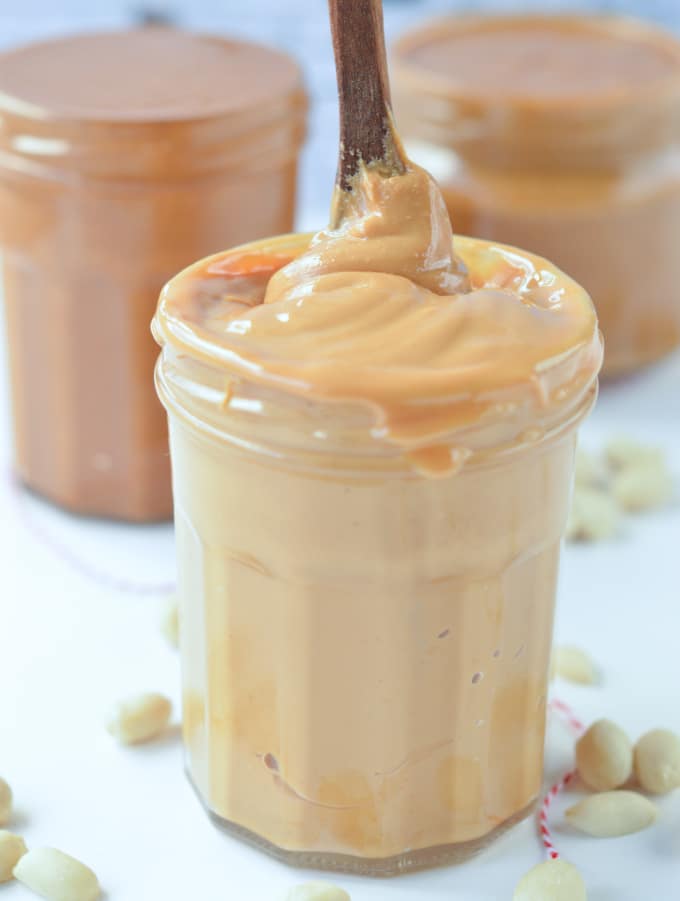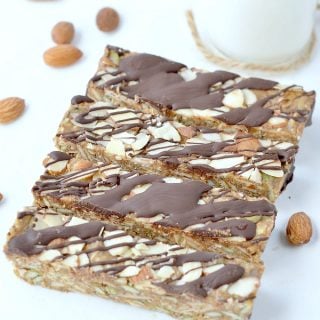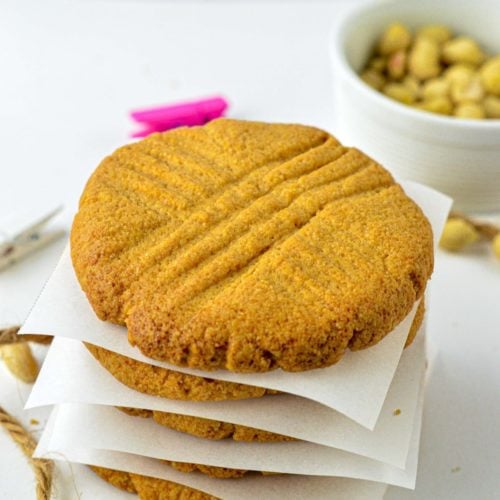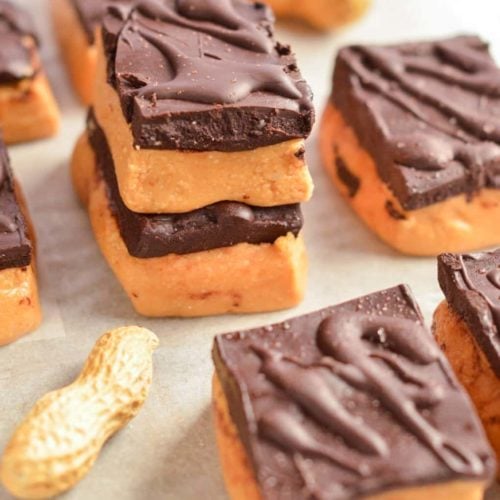Is Peanut Butter Keto? Can I eat any Peanut Butter?
This recipe may contain Amazon or other affiliate links. As an Amazon Associate I earn from qualifying purchases.
Peanut butter is one of the most commonly used spreads in the world. According to researchers, the global Peanut Butter market was $3 billion in 2014.
In the U.S. alone, 297 million people eat peanut butter regularly!
Given how popular peanut butter is, I wanted to get all the facts and answer the question, is peanut butter keto?

What is Peanut Butter?
We first need to have a look at the history of Peanut Butter. Peanuts originated from South America, where the Incan population regularly consumed it.
It was brought to Europe by explorers, and it went to Northern America from Africa in the 1700s. At that point, peanuts were just consumed roasted, not as butter.
It is believed that the first commercial Peanut Butter was created at the end of the 19th century in St. Louis as a protein substitute. From there, it grew to become what it is today, a cheap spread loved by many.
However, with tastes changing over the years, peanut butter evolved from being strictly made of peanuts to more complex (and questionable) recipes.
True and Natural Peanut Butter
The real, healthy peanut butter is made from only one ingredient. Peanuts. You might sometimes find a pinch of salt added to your PB, but that is all.
True peanut butter is sugar-free and high in oil, and when left alone for a while, some separation happens. It leaves a layer of oil on the top of the jar. It’s perfectly natural, and all you need is a quick stir for it to come back to normal.
This version of Peanut Butter is perfectly Keto-friendly – more on that below.
Peanut Spreads
While true peanut butter should only be made of peanuts, many commercial brands include additives as well as large quantities of sugar. They do so to make the butter more spreadable, taste sweeter, or last longer.
It is quite obvious that if you see Added Sugar, Honey, Molasses, or Cane Sugar, it is NOT keto-friendly.
Refined peanut spreads often contain the following ingredients.
- Sugar (Honey, Molasses or Cane Sugar)
- Vegetable Oil (palm oil, sunflower oil, or rapeseed oil)
- Flavors (vanilla, chocolate, etc.)
If you see any of these on your food label, stay clear!
How much carbohydrate does Peanut Butter contain?
True peanut butter is generally relatively low in carbs. A typical peanut butter (made only from peanuts) would contain only 1.4 grams of net carbs:
| Calories: 117kcal | % DAILY VALUE |
|---|---|
| FAT: 9.6g | 15% |
| SATURATED FAT:1.3g | 8% |
| CARBOHYDRATES: 2.9g | 1% |
| FIBER: 1.5g | 6% |
| SUGAR: 1.2g | 1% |
| NET CARBS: 1.4g | |
| PROTEIN: 5.3g | 11% |
Natural peanut butter contains a good amount of healthy fat. It is perfect for reaching your macro on a keto diet.
As a result, peanut butter is not only a quite good Keto-friendly ingredient, but it also serves as a good source of proteins.
In fact, some protein powder manufacturers use peanuts as their base ingredients!
What are the good micronutrients in Peanut Butter?
Peanut butter is a source of many good micronutrients that promote better health.
| Calories: 117kcal | % DAILY VALUE |
|---|---|
| SODIUM: 36mg | 2% |
| POTASSIUM: 131.6mg | 4% |
| IRON: 1.2mg | 7% |
| CALCIUM: 10.8mg | 1% |
| MAGNESIUM: 54mg | 17% |
| NIACIN: 4.2mg | 28% |
| PHOSPHOROUS: 110mg | 16% |
| RIBOFLAVIN (B2): 0.06mg | 5% |
| THIAMIN (B1): 0.05mg | 5% |
| VITAMIN B6: 0.16mg | 12% |
| VITAMIN E: 2.9mg | 36% |
| ZINC: 0.8mg | 10% |
It contains among others:
- Iron: Essential for a good transport of oxygen in your body. 1.2mg per serving – 18mg (women) or 8mg (men) recommended daily.
- Magnesium: Essential for your body. It contributes to regulating muscles and nerve functions as well as blood sugar levels and blood pressure. 54mg per serving – 310mg (women) or 400mg (men) recommended daily.
- Niacin: Helps cells produce energy and facilitate digestion. 4.2mg per serving – 15mg recommended daily.
- Phosphorous: Helps cells produce energy and facilitates digestion. 110mg per serving – 700mg recommended daily.
- Riboflavin (B2): Vitamin B2 helps break down macro-nutrients and therefore is critical for your body to produce energy. 0.06mg per serving – 1.2mg recommended daily.
- Thiamin (B1): Vitamin B1 supports healthy growth. 0.05mg per serving – 1.1mg recommended daily.
- Vitamin B6: B6 is essential for your digestion, supporting enzyme creation. 0.16mg per serving – 1.3mg recommended daily.
- Vitamin E: Vitamin E is a defense against free radicals and may reduce heart disease. 2.9mg per serving – 8mg recommended daily.
- Zinc: Zinc is used by the immune system but is also an essential element for DNA formation. 0.8mg per serving – 8mg recommended daily.
What are the health benefits of peanut butter?
As a result of all these macro- and micro-nutrients, peanut butter can help support, according to current research:
- Weight-loss: because of its low level of sugar and healthy fats
- Heart health: with its healthy fats and vitamins like Vitamin E.
- Immune system: through various vitamins and minerals like Zinc.
- Muscle growth: with its high levels of protein and vitamins like B1 or Zinc.
- Blood sugar level control: because of minerals like Magnesium.
But once again, be mindful of the kind of peanut butter you purchase. A highly processed peanut butter would have far fewer micro-nutrients.
Natural peanut butter is also 100% gluten-free!
Other Nut Butter To Consider
Peanut butter is not the only keto-friendly nut butter.
- Almond butter is a good keto compatible nut butter, high in fat, with a good amount of vitamins.
- Hazelnut butter is an excellent keto-friendly nut butter high in healthy fat.
- Cashew butter
- Sunflower Seed Butter
Frequently Asked Questions
Yes, you can! In fact, homemade peanut butter is straightforward to make.
Think about it. It is a recipe that requires only one cheap ingredient!
Peanuts.
There are a few tips and tricks to know to make the best smooth peanut butter, so make sure you follow my Peanut Butter Recipe to make your own!
Peanut butter is widely considered a healthy ingredient. However, there are two potential issues to be aware of.
Peanut allergies. It is self-evident, but anyone with peanut allergies must avoid peanut butter. Nothing in the manufacture of peanut butter reduces its allergen levels.
Aflatoxins. Aflatoxins are toxic compounds produced by some types of mold present in the soil. These chemicals might be linked to some form of cancer. However, the process of manufacturing peanut butter might reduce the amount of aflatoxin to levels that have no long-term effects.
My Favorite Peanut Butter Recipes
Check out below my favorite recipes made with peanut butter:
Posted In:
Category:
ArticlesDisclaimer
The recipes, instructions, and articles on this website should not be taken or used as medical advice. The nutritional data provided on Sweetashoney is to be used as indicative only. The nutrition data is calculated using WP Recipe Maker. Net Carbs is calculated by removing the fiber and some sweeteners from the total Carbohydrates.
You should always calculate the nutritional data yourself instead of relying on Sweetashoney's data. Sweetashoney and its recipes and articles are not intended to cure, prevent, diagnose, or treat any disease. Sweetashoney cannot be liable for adverse reactions or any other outcome resulting from the use of recipes or advice found on the Website.





Share this post!
If you enjoyed this post, share it with your close ones!
Leave a comment
Hi, really enjoy reading your content. How does peanut butter compare to peanut butter powder? Have you had any experience with PB powder? Thanks
I never used PB powder before, the goal of the powder is to remove the fat of the peanut butter, often balanced by added sweetener. Since keto is a diet that focus on eating fat, I always eat real peanut butter
Do you have a favorite brand of peanut butter that you use? I really don’t want to make my own. I love your blog and we follow you on Facebook. I have learned so much from you. I did Adkins back in the 70’s and 80’s. So much more information these days, more products too.
Yes I do, but since I live in New Zealand its a local brand called Pics, note sure it’s available somewhere else. Simply look at the ingredients listed on the peanut butter jar, it should only shows peanuts or eventually added salt but no added sugar or added oil. That’s the best way to pic a peanut butter brand that is keto approved. Take care, Carine
Thank you for your answer. It helps to have some guidance. Have a great day.